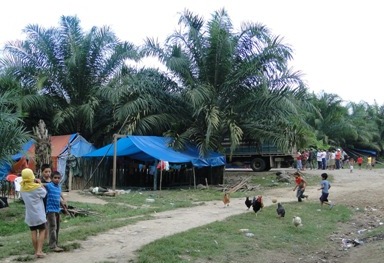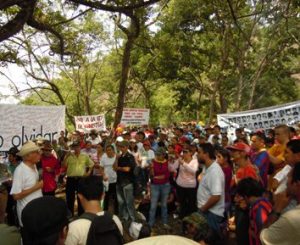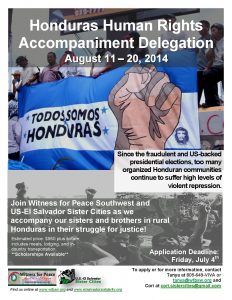Delegations, Human Rights
Sister City Committee Member Reflects on Human Rights Delegation to Honduras
By Libby Pappalardo
Friends of Chilama
Crystal Lake, IL
On our first morning in Honduras, we awoke to news of a horrendous fire at Comayagua Prison where 370 prisoners burned to death. Held at gunpoint, prisoners were kept from fleeing the fire and the dead were left on a curb outside the prison to decompose in 90 degree heat. This total lack of respect for human life became a central theme throughout our 8-day human rights delegation to Honduras.
Since a military coup in 2009 overthrew democratically elected President Manuel Zalaya, there has been a dramatic increase in human rights abuses. Honduras, now the most violent country in the world, has more daily homicides than a war zone.
Campesino farm cooperatives were given government land back in the early 1970s as part of agrarian reform. However, in the 1990s, a new law of agricultural modernization was enacted which allowed the sale and division of these lands. Within four years, 70% was confiscated by the threatening tactics of large land owners, especially Miguel Facusse, Rene Morales, and Reynaldo Canales who planted African Palms for palm oil export. These ruthless land owners with the aid of the corrupt Honduran military, police, and private security guards have assassinated over 60 campesino leaders, human rights workers and journalists with absolute impunity. Facusse, who is linked to drug trafficking and was one of the key supporters of the ’09 coup, now controls over a half million acres of land. In addition, multinational corporations like Standard Fruit (Dole) are illegally claiming land and using threats and violence to run campesino families off their farms.
Our delegation, organized by La Voz de los de Abajo- Chicago from Feb.14-22,2012 was there to travel throughout the heavily militarized Aguan Valley, and accompany campesinos living under constant threat of eviction from their land. We also planned to attend an international human rights encuentro in Tocoa, located in the heart of the Aguan.
We received word that members of the Saludos LisLis community, who had been evicted from their coastal land the week before, were beginning to return to their community. We were to spend most of the day accompanying them in case the military would return. On our arrival, we gathered with the families who were visibly terrified though somewhat relieved to have internationals in their midst who could document the possible violence. They were traumatized by the loss of 80 homes smashed flat by a bulldozer that also destroyed most of the subsistence crops. They explained that 200 troops, some wearing Dole shirts under their military uniforms, invaded Saludos Lis Lis at 6am giving families 30 minutes to pack and leave. Personal items such as toys, clothes, and pots and pans were still strewn about the rubble, a reminder of their hasty departure. School was closed and it was doubtful that teachers would return anytime soon. People were hungry and scared but they had nowhere else to go while they continued the struggle for title to the land that is rightfully theirs.
Next we visited Guadelupe Carne which has become a model for other campesino communities because of its success at gaining title to much of the land. The community of Guadalupe Carne is extremely well organized and has developed over 40 cooperatives, including a restaurant, progressive radio station run by their youth, women’s sewing coop, farming, livestock etc. They even have a beautiful school built by the government. During the war in El Salvador, the US used this area as a base for training Salvadoran soldiers and today the Honduran military has set up camp in the middle of the community as a means of daily intimidation. In December 2010, between 500 and 1,000 police and military surrounded the town and searched every home for alleged arms which were never found, but the situation worsened and later 5 campesinos were brutally murdered. It was emphasized that no matter how hard they work, it is a constant struggle to keep their land and stand against never ending death threats.
Rigores is a ten- year- old community that was burned down by police last June. Over 100 homes were destroyed and its three churches and seven-room schoolhouse were bulldozed. We were told during our visit to Rigores that police threw the children, and beat and jailed some of the adults. The courageous head teacher shared that their determination to make education a top priority despite the destruction of their school. We observed outdoor class rooms where children studied under by shade trees whose branches held dangling blackboards. The new school is nearly finished but families still worry about the return of the military and many continue to suffer from PTSD. They will not give up. One father explained, “We are just poor people trying to make a better life for our children”.
The international encuentro in Tocoa was very uplifting and hopeful inspite of the many testimonials of human rights abuses. It was extremely well attended by over 1,100 people including internationals from Haiti, Mexico, Nicaragua, Guatemala, El Salvador, Costa Rica, Cuba, Poland, Norway, the United States and others. Signs of hope discussed were the Bolivarian Revolution, Cuban Revolution, and the Church’s Theology of Liberation. Many speakers said that the accompaniment of internationals has saved many lives.
We can all work to end the repression in Honduras by contacting the Dole Corporation, and calling our US Representatives and Senators and demanding an end to US financial support for the Honduran military. US-El Salvador Sister Cities was very quick to respond to the ‘09 Honduran coup and dramatic increase in violence that followed, and continues to raise awareness and organize against human rights abuses throughout Honduras. It is a great organization to support in its mission to build justice in Honduras and block the spread of militarization throughout Central America.
For more information see also:
Our hope is in our struggle: Reclaiming Land and Life in Honduras-Truthout.org
US carries lessons of Iraq into Honduras drug war –New York Times




